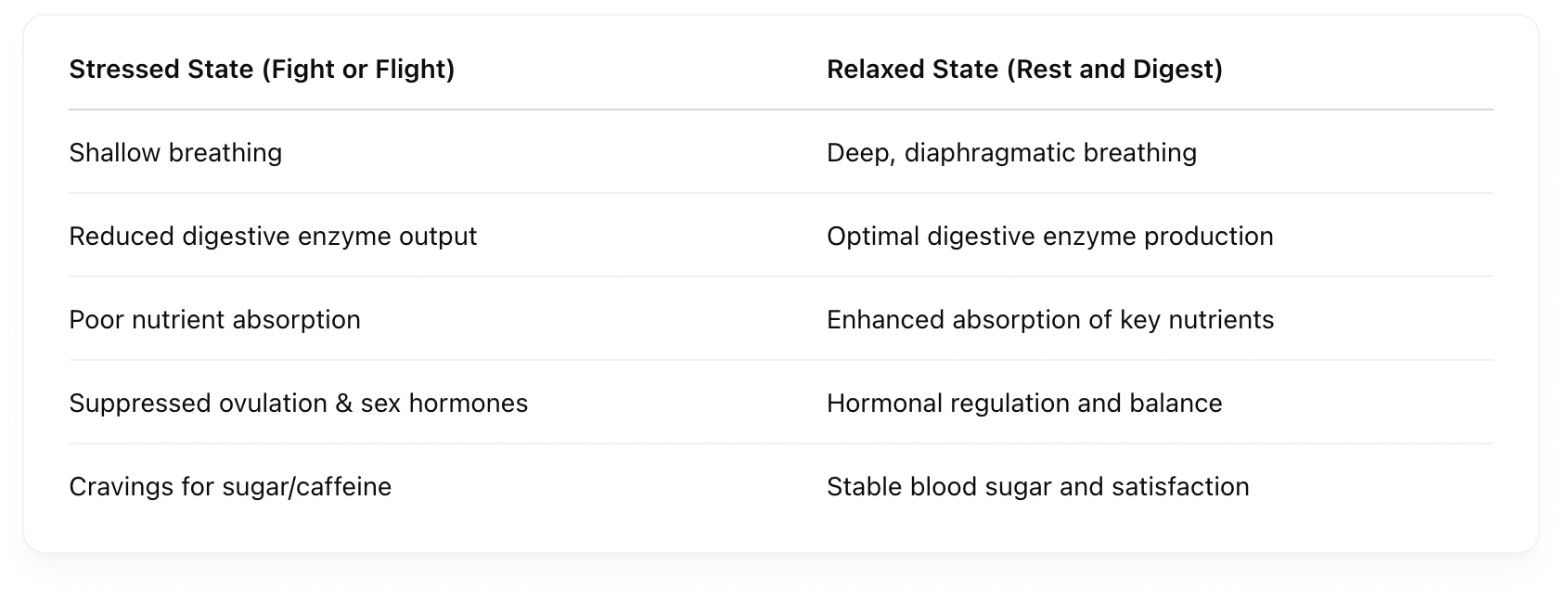How Mind-Body Nutrition Supports Your Fertility Hormones
When navigating fertility challenges, it's easy to focus on what to eat — the best supplements, fertility-friendly foods, superfoods for egg health. But an often-overlooked piece of the puzzle is how we eat, and the physiological and emotional state we’re in while eating. This is where the science of Mind-Body Nutrition becomes incredibly powerful.
Mind-Body Nutrition teaches us that food is only one part of the nourishment equation. The other part? The way your thoughts, emotions, and nervous system responses around food — all of which deeply influence digestion, hormonal balance, and ultimately, fertility.
Let’s explore how this works, and how you can use these principles to support your body’s natural ability to conceive.
Why the Nervous System Matters for Fertility
Your reproductive system is incredibly sensitive to your internal environment — particularly the signals your nervous system is sending. When your brain perceives stress or threat, it prioritizes short-term survival over long-term processes like digestion or reproduction.
This means if you’re constantly in a sympathetic (fight or flight) state, your body may:
Suppress or delay ovulation
Alter progesterone and estrogen balance
Disrupt the HPA (hypothalamic-pituitary-adrenal) axis
Impair thyroid function — which directly affects fertility
Reduce digestive enzyme output, impacting nutrient absorption
This doesn’t just happen in moments of acute stress. Chronic stress — from fertility treatments, work pressure, past trauma, or even harsh self-talk — can keep your body stuck in a state of high alert.
In contrast, when you activate your parasympathetic (rest and digest) state, your body shifts into healing and reproductive mode. Ovulation is more likely to occur, digestion improves, and hormonal rhythms begin to recalibrate.
Eating in a Stressed State vs a Relaxed State
Let’s look at what happens in the body depending on your state while eating:
As you can see, eating in a relaxed state supports digestion, hormone balance, and fertility far more effectively — even if the actual food on the plate is the same.
A Case Study: Sarah’s Story
Sarah, 36, came to see me after two years of trying to conceive. She had a history of irregular cycles, high-stress work demands, and digestive discomfort. She’d already cleaned up her diet: organic food, fertility-friendly recipes, no alcohol or caffeine, and a strict supplement protocol. But still — no pregnancy.
When we dug deeper, we discovered that Sarah was:
Eating most meals at her desk or in the car
Rarely chewing her food properly
Often eating in a rushed or anxious state
Constantly analysing her food choices for “mistakes”
We shifted her focus from just what to eat, to how she was eating.
Over several weeks, we implemented:
A 5-minute meal ritual before eating to down-regulate her nervous system
Breathing techniques to activate the parasympathetic state
Mindful eating strategies like chewing slowly, removing distractions, and using all five senses
A compassionate approach to food — reducing guilt and pressure
Her digestion improved, her bloating subsided, and within 3 months her cycle became more regular. While every body is different, for Sarah, addressing stress and nervous system dysregulation created the space her body needed to conceive — naturally.
Simple Mind-Body Tools You Can Start Using Today
Here are some evidence-based practices you can bring into your daily routine:
1. Breathwork Before Meals
Before eating, take 5 slow belly breaths. This tells your body, “I’m safe. It’s time to digest and receive nourishment.”
2. Slow Down
Try setting a timer and spending 15–20 minutes on each meal. Put your fork down between bites and chew thoroughly.
3. Eat Without Distractions
Turn off screens. Be present. Notice the textures, colors, smells, and flavors of your food.
4. Create a Meal Ritual
This could be as simple as lighting a candle, saying a short gratitude phrase, or playing calming music before meals.
5. Check in With Your Body
Ask: “Am I feeling rushed, anxious, or calm?” The goal isn’t perfection, but awareness and small shifts.
Why This Approach Matters for Fertility
If you’re trying to conceive, your body needs to feel safe, well-nourished, and supported. This doesn’t happen through food alone. It happens through how you relate to food, your body, and your environment.
Mind-body nutrition gives you tools to:
Improve nutrient absorption with or without changing your diet
Lower cortisol and inflammation
Increase metabolic efficiency and hormone regulation
Cultivate a supportive, trusting relationship with your body
Final Thoughts
Fertility is not just about biology — it’s about connection. Connection to your food, your body, and your emotions. Mind-body nutrition gives you a way to come back to that connection, gently and powerfully.
So the next time you sit down to eat, remember: your nervous system is part of your fertility plan. Slowing down, breathing, and receiving your food with intention isn’t just good for your digestion — it’s a form of nourishment that supports your entire reproductive system.
Want to explore this more deeply? I offer 1:1 consultations that integrate both nutritional science and eating psychology to support you wherever you are on your fertility journey. Book Here

